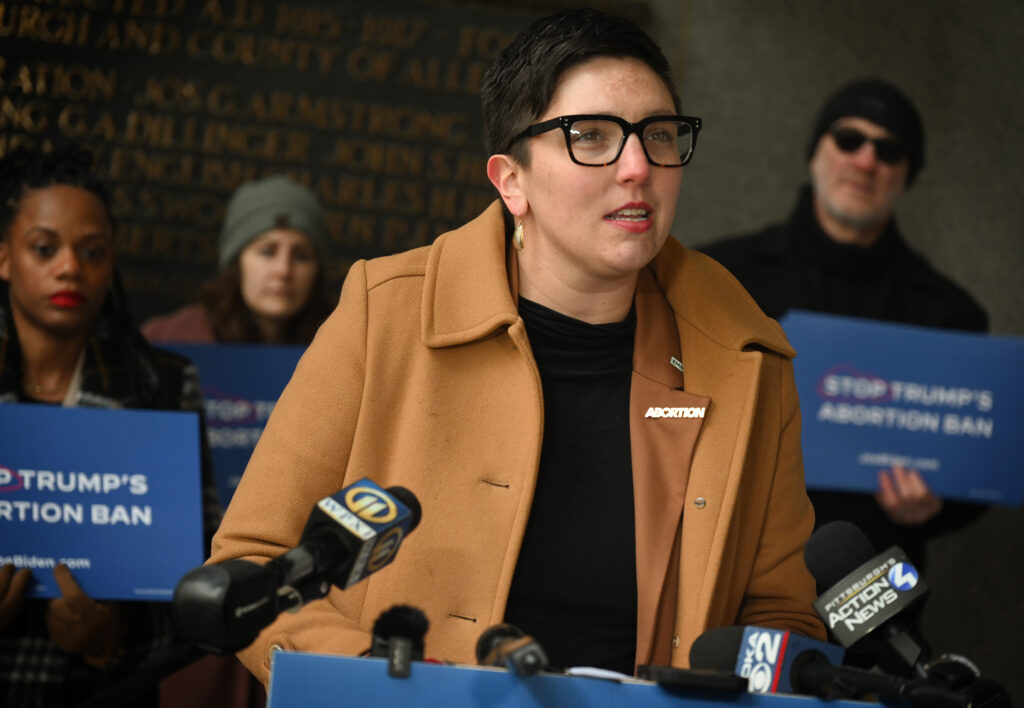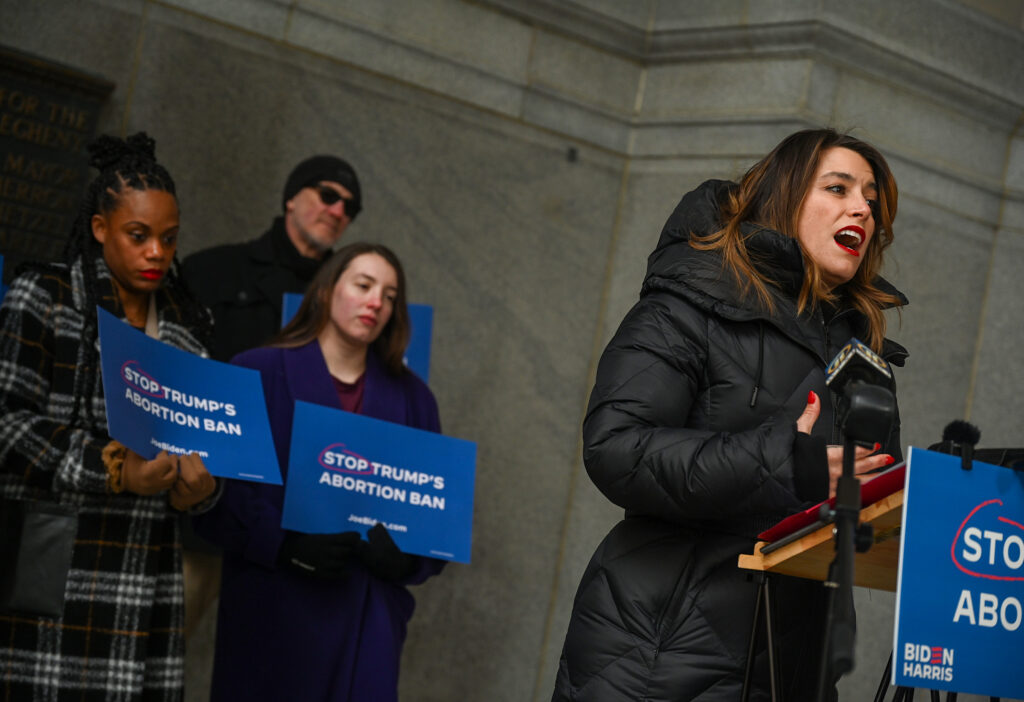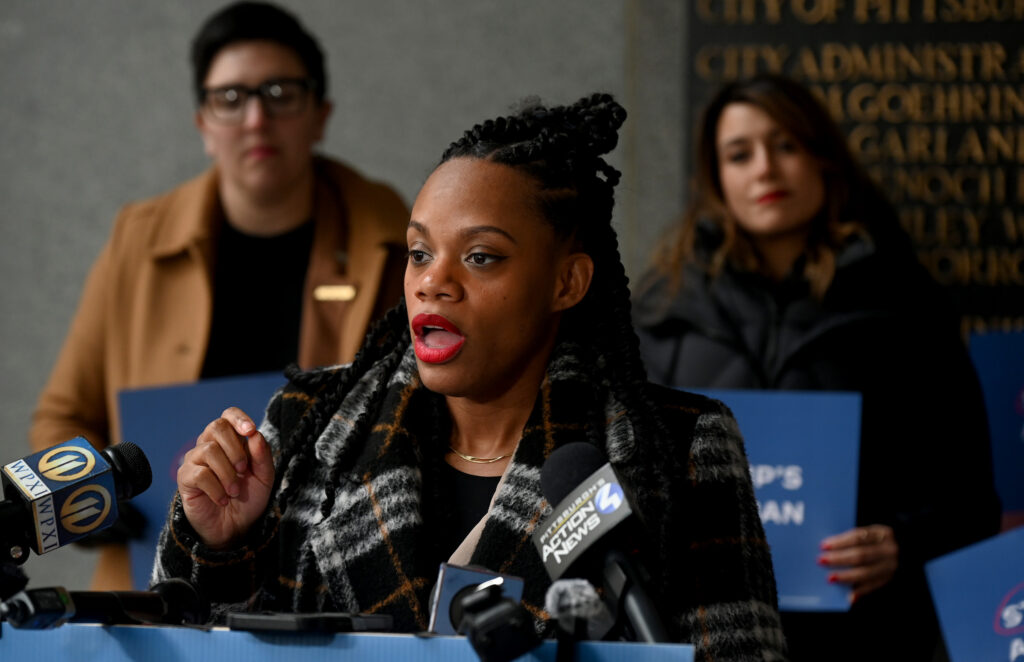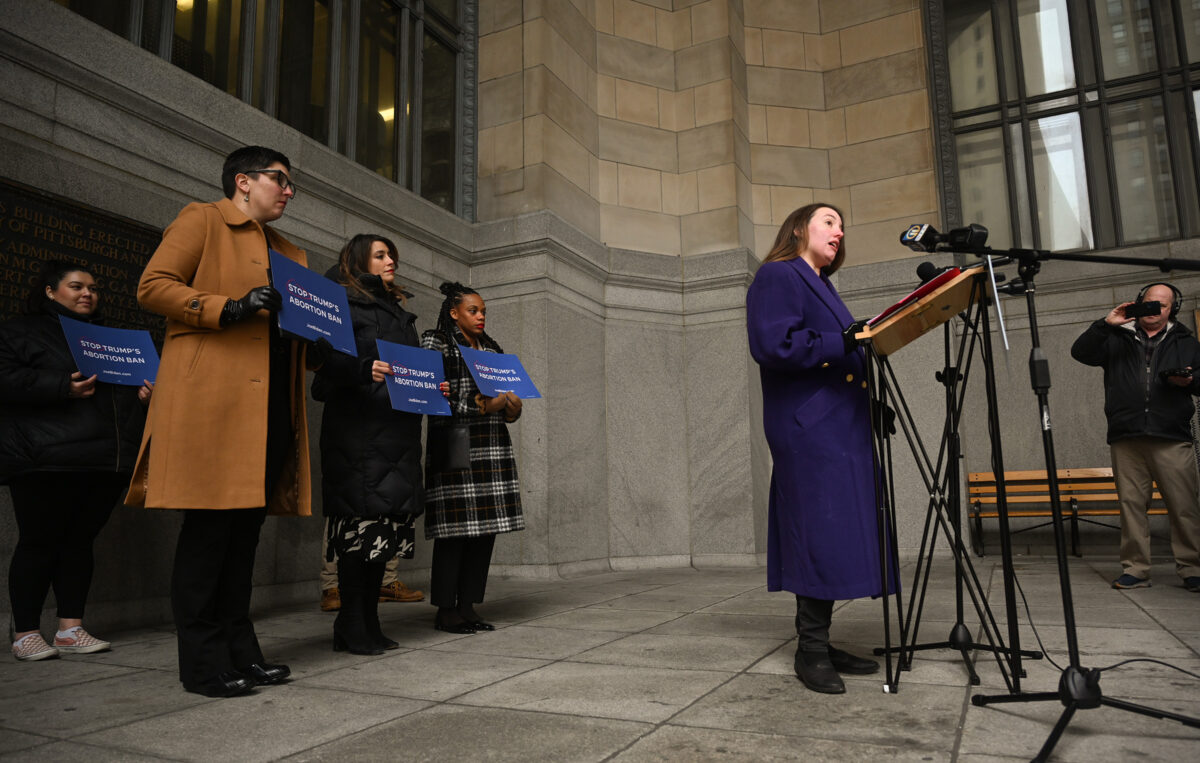The politics of abortion became personal in the cold portico of Downtown’s City-County Building on Monday.
Democrats across the country used what would have been the 51st anniversary of Roe v. Wade to make certain abortion rights remain central to this year’s political battles. It’s an issue that exploded in the summer of 2022 with the U.S. Supreme Court’s ruling on Dobbs v. Jackson Women’s Health Organization, which overturned Roe.
In Pittsburgh, three of the region’s progressive political leaders came together on Grant Street, held signs reading “Stop Trump’s Abortion Ban” and discussed this year’s election cycle and what it holds for the future of women’s reproductive rights. They mentioned the stories of pain they’d heard since the constitutional right to an abortion was struck down, and how the Dobbs decision impacted them personally.

The most poignant story, however, was told not by an elected official but by Kelsey Leigh, who described her experience with abortion and how it compelled her to become an advocate for reproductive rights.
She talked about the conversations she had with women in Ohio and West Virginia in the days after the Dobbs decision. In those two nearby states, women faced severe restrictions, if not bans, on abortion access. Leigh said she and other volunteers at an Allegheny County abortion clinic spoke to dozens of scared and desperate women faced with traveling hundreds of miles to access abortion care, fearing arrest if they did so, and wondering how they would pay for food and lodging.
“We need to remember what happens when we sit out elections, when we don’t pay attention to judicial nominations,” Leigh said. “And we — meaning, especially, we white women — need to reflect on the hubris of thinking we’ve got Roe, we’re good.”
In 2016, Leigh had been pregnant for 21 weeks when a routine ultrasound revealed her baby’s limbs and neck were deformed. If she continued with the pregnancy until birth, her child would most likely lack the ability to swallow or breathe. His bones would break during delivery, no matter the method. She decided to end the pregnancy.
“I could not and would not carry my son for four more months, knowing his life would be full of pain and suffering,” she said. “I said goodbye before I ever held him, a decision I made on my own, a decision backed with love and mercy.”
State Rep. Jessica Benham, D-South Side, said she had been moved by women who have told her about the difficulties surrounding the decision to have an abortion and “have struggled with public judgment because of the decisions they have made, decisions that shouldn’t be under scrutiny because they’re private.”

Allegheny County Executive Sara Innamorato, the first woman to serve in the role, lamented that the issue of abortion access is now decided by political leaders and judges instead of by the women whose health and lives are most affected.
“I’m a woman in my 30s,” she said. “It’s me, it’s my sister, it’s my friend who’s going through this process of deciding if and when and how they want to have children. And sometimes those are deeply exciting processes, and sometimes they are devastating, but above all they’re private and personal decisions.”
U.S. Rep. Summer Lee, D-Swissvale, said that women now have fewer rights than those enjoyed by their mothers and grandmothers. She listed some of the scenarios women have faced after the fall of Roe: “Ten-year-old rape survivors forced to become parents, miscarriages that turn into sepsis, women forced to carry ectopic pregnancies to term.”
Lee and Benham said the lack of abortion access is especially acute for women in rural areas, those with disabilities, members of the LGBTQ+ community, and Black women, who already face higher rates of maternal mortality.

“It’s unconscionable to force Black women … to give birth when we can’t guarantee we can even keep them alive in the process,” Lee said.
Benham reflected on her own situation: She has a genetic condition that would make a pregnancy risky.
“If I wanted to carry to term, I’d want to be able to access good reproductive health care, which as a queer disabled woman is not a guarantee for me,” she said.
Innamorato tied the issue to both state and national politics and stressed the need to keep Democrats in the majority in the state House, flip the state Senate to Democratic control, and reelect Democratic leaders on the federal level.
Polls show most people disapprove of the Dobbs decision. In a number of states, including Kansas, Kentucky, Michigan and Ohio, voters have passed statewide initiatives that have affirmed abortion rights or rebuffed attempts to restrict abortion access.
“The stakes in 2024 are beyond clear,” Lee said. “And they’re as high as they’ve ever been. Beside defeating the extremism that [former President Donald] Trump has ushered in or that Trump has highlighted, it’s also about stopping the capture of our courts and elections by right wing billionaires and dark money networks who are insistent on controlling us” by eroding all rights and weakening democratic institutions.
Key for Democrats, she said, was organizing to “elect reproductive champions up and down the ballot to make reproductive health care a reality for all.”
Steve is a photojournalist and writer for the Pittsburgh Post-Gazette, but he is currently on strike and working as a Union Progress co-editor. Reach him at smellon@unionprogress.com.



